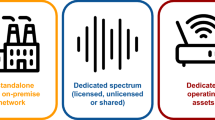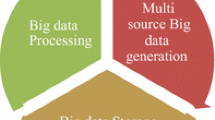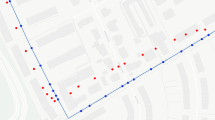Abstract
Nowadays, location-based services (LBS) are facilitating people in daily life through answering LBS queries. However, privacy issues including location privacy and query privacy arise at the same time. Existing works for protecting query privacy either work on trusted servers or fail to provide sufficient privacy guarantee. This paper combines the concepts of differential privacy and k-anonymity to propose the notion of differentially private k-anonymity (DPkA) for query privacy in LBS. We recognize the sufficient and necessary condition for the availability of 0-DPkA and present how to achieve it. For cases where 0-DPkA is not achievable, we propose an algorithm to achieve 𝜖-DPkA with minimized 𝜖. Extensive simulations are conducted to validate the proposed mechanisms based on real-life datasets and synthetic data distributions.





Similar content being viewed by others
References
Apache commons mathematics library, http://commons.apache.org/proper/commons-math/
Open street map, http://www.openstreetmap.org/
Ahmadzadeh R, Kordrostami S, Amirteimoori A (2017) Evaluating the efficiency of a two-stage network structure with the use of fractional programming. Discrete Mathematics. Algorithms Appl 09(03):1750,034. https://doi.org/10.1142/S1793830917500343
Andrés ME, Bordenabe NE, Chatzikokolakis K, Palamidessi C (2013) Geo-indistinguishability: differential privacy for location-based systems. In: Proceedings of the 2013 ACM SIGSAC conference on Computer & Communications Security, CCS ’13. ACM, New York, pp 901–914
Bamba B, Liu L, Pesti P, Wang T (2008) Supporting anonymous location queries in mobile environments with privacygrid. In: Proceedings of the 17th international conference on world wide web, WWW ’08. ACM, New York, pp 237–246
Bordenabe NE, Chatzikokolakis K, Palamidessi C (2014) Optimal geo-indistinguishable mechanisms for location privacy. In: Proceedings of the 2014 ACM SIGSAC conference on computer and communications security, CCS ’14. ACM, New York, pp 251–262
Boyd K, Lantz E, Page D (2015) Differential privacy for classifier evaluation. In: Proceedings of the 8th ACM workshop on artificial intelligence and security, AISec ’15. ACM, New York, pp 15–23
Cai Z, He Z, Guan X, Li Y (2017) Collective data-sanitization for preventing sensitive information inference attacks in social networks. IEEE Trans Dependable Secure Comput PP(99):1–1. https://doi.org/10.1109/TDSC.2016.2613521
Capurso N, Song T, Cheng W, Yu J, Cheng X (2017) An android-based mechanism for energy efficient localization depending on indoor/outdoor context. IEEE Internet Things J 4(2):299–307. https://doi.org/10.1109/JIOT.2016.2553100
Chen L, Cong G, Cao X, Tan KL (2015) Temporal spatial-keyword top-k publish/subscribe. In: 2015 IEEE 31St international conference on data engineering, pp 255–266. https://doi.org/10.1109/ICDE.2015.7113289
Chen X, Pang J (2013) Exploring dependency for query privacy protection in location-based services. In: Proceedings of the third ACM conference on data and application security and privacy, CODASPY ’13. ACM, New York, pp 37–48. https://doi.org/10.1145/2435349.2435354
Chen X, Pang J (2014) Protecting query privacy in location-based services. GeoInformatica 18(1):95–133
Dwork C (2006) Differential privacy. In: 33Rd International Colloquium on Automata, Languages and Programming, part II (ICALP 2006). Springer, Venice
Dwork C (2008) Differential privacy: a survey of results. Springer, Berlin
Friedman A, Schuster A (2010) Data mining with differential privacy. In: Proceedings of the 16th ACM SIGKDD international conference on knowledge discovery and data mining, KDD ’10. ACM, New York, pp 493–502
Haney S, Machanavajjhala A, Ding B (2015) Design of policy-aware differentially private algorithms. Proc VLDB Endow 9(4):264–275
He Z, Cai Z, Sun Y, Li Y, Cheng X (2017) Customized privacy preserving for inherent data and latent data. Personal Ubiquitous Comput 21(1):43–54. https://doi.org/10.1007/s00779-016-0972-2
He Z, Cai Z, Wang X (2015) Modeling propagation dynamics and developing optimized countermeasures for rumor spreading in online social networks. In: 2015 IEEE 35Th international conference on distributed computing systems, pp 205–214. https://doi.org/10.1109/ICDCS.2015.29
He Z, Cai Z, Yu J (2017) Latent-data privacy preserving with customized data utility for social network data. IEEE Trans Vehicular Technol PP(99):1–1. https://doi.org/10.1109/TVT.2017.2738018
He Z, Cai Z, Yu J, Wang X, Sun Y, Li Y (2017) Cost-efficient strategies for restraining rumor spreading in mobile social networks. IEEE Trans Veh Technol 66(3):2789–2800. https://doi.org/10.1109/TVT.2016.2585591
Huang H, Gong T, Chen P, Malekian R, Chen T (2016) Secure two-party distance computation protocol based on privacy homomorphism and scalar product in wireless sensor networks. Tsinghua Sci Technol 21(4):385–396. https://doi.org/10.1109/TST.2016.7536716
Jha SK (2017) Revisiting calculation of moments of number of comparisons used by the randomized quick sort algorithm. Discrete Mathematics. Algorithms Appl 09(01):1750,001. https://doi.org/10.1142/S179383091750001X
Jorgensen Z, Yu T, Cormode G (2015) Conservative or liberal? Personalized differential privacy. In: 2015 IEEE 31St international conference on data engineering, pp 1023–1034
Kasiviswanathan SP, Nissim K, Raskhodnikova S, Smith A (2013) Analyzing graphs with node differential privacy. In: Proceedings of the 10th theory of cryptography conference on theory of cryptography, TCC’13. Springer, Berlin, pp 457–476
Kifer D, Machanavajjhala A (2011) No free lunch in data privacy. In: Proceedings of the 2011 ACM SIGMOD international conference on management of data, SIGMOD ’11. ACM, New York, pp 193–204
Liang Y, Cai Z, Han Q, Li Y (2017) Location privacy leakage through sensory data. Security and Communication Networks
Liu C, Chakraborty S, Mittal P (2016) Dependence makes you vulnerable: differential privacy under dependent tuples. In: Proceedings of the network and distributed system security symposium 2016 (NDSS), pp 0-0, San Diego, California, USA
Niu B, Li Q, Zhu X, Cao G, Li H (2014) Achieving k-anonymity in privacy-aware location-based services. In: INFOCOM
Niu B, Li Q, Zhu X, Cao G, Li H (2015) Enhancing privacy through caching in location-based services. In: INFOCOM
Pingley A, Zhang N, Fu X, Choi HA, Subramaniam S, Zhao W (2011) Protection of query privacy for continuous location based services. In: 2011 Proceedings of IEEE INFOCOM, pp 1710–1718
Shokri R, Theodorakopoulos G, Troncoso C, Hubaux JP, Le Boudec JY (2012) Protecting location privacy: optimal strategy against localization attacks. In: Proceedings of the 2012 ACM conference on computer and communications security, CCS ’12. ACM, New York, pp 617–627
Song T, Capurso N, Cheng X, Yu J, Chen B, Zhao W (2017) Enhancing GP with lane-level navigation to facilitate highway driving. IEEE Trans Veh Technol 66(6):4579–4591. https://doi.org/10.1109/TVT.2017.2661316
Stoddard B, Chen Y, Machanavajjhala A (2014) Differentially private algorithms for empirical machine learning. arXiv:1411.5428
Sweeney L (2002) K-anonymity: a model for protecting privacy. Int J Uncertain Fuzziness Knowl.-Based Syst 10(5):557–570
To H, Ghinita G, Shahabi C (2014) A framework for protecting worker location privacy in spatial crowdsourcing. Proc VLDB Endow 7(10):919–930
Wang Y, Xu D, Li F (2016) Providing location-aware location privacy protection for mobile location-based services. Tsinghua Sci Technol 21(3):243–259. https://doi.org/10.1109/TST.2016.7488736
Xiao Y, Xiong L (2015) Protecting locations with differential privacy under temporal correlations. In: Proceedings of the 22nd ACM SIGSAC conference on computer and communications security (CCS), pp 1298–1309, enver, Colorado, USA
Xue M, Kalnis P, Pung HK (2009) Location diversity: enhanced privacy protection in location based services. In: Proceedings of the 4th international symposium on location and context awareness, loCA ’09. Springer, Berlin, pp 70–87
Yang B, Sato I, Nakagawa H (2015) Bayesian differential privacy on correlated data. In: Proceedings of the 2015 ACM SIGMOD International Conference on Management of Data (SIGMOD), pp 747–762, Melbourne, Victoria, Australia
Wang Y, Cai Z, Ying G, Gao Y, Tong X, Wu G (2016) An incentive mechanism with privacy protection in mobile crowdsourcing systems. Comput Netw 102(Supplement C):157–171. https://doi.org/10.1016/j.comnet.2016.03.016
Zeng C, Naughton JF, Cai JY (2012) On differentially private frequent itemset mining. Proc VLDB Endow 6(1):25–36
Zhang L, Cai Z, Wang X (2016) Fakemask: a novel privacy preserving approach for smartphones. IEEE Trans Netw Serv Manag 13(2):335–348. https://doi.org/10.1109/TNSM.2016.2559448
Zheng X, Cai Z, Li J, Gao H (2017) Location-privacy-aware review publication mechanism for local business service systems. In: 2017 Proceedings of IEEE INFOCOM
Zheng X, Cai Z, Yu J, Wang C, Li Y (2017) Follow but no track: privacy preserved profile publishing in cyber-physical social systems. IEEE Internet Things J PP(99):1–1. https://doi.org/10.1109/JIOT.2017.2679483
Zhou Z, Cheng Z, Zhang LJ, Gaaloul W, Ning K (2017) Scientific workflow clustering and recommendation leveraging layer hierarchical analysis. IEEE Trans Services Comput PP(99):1–1. https://doi.org/10.1109/TSC.2016.2542805
Funding
This work is supported by Project (no. 61602129, 61632010, 61772157, U1509216) supported by the National Natural Science Foundation of China; This work is partly supported by the National Science Foundation (NSF) under grant NOs. 1252292, 1741277 and 1704287; China Postdoctoral Science Foundation Funded Project (grant no. 2014M561351); Heilongjiang Postdoctoral Science Foundation Funded Project (grant no. LBH-Z14118); and Sichuan Science and Technology Foundation-funded Project (grant no. 2017JZ0031).
Author information
Authors and Affiliations
Corresponding author
Rights and permissions
About this article
Cite this article
Wang, J., Cai, Z., Li, Y. et al. Protecting query privacy with differentially private k-anonymity in location-based services. Pers Ubiquit Comput 22, 453–469 (2018). https://doi.org/10.1007/s00779-018-1124-7
Received:
Accepted:
Published:
Issue Date:
DOI: https://doi.org/10.1007/s00779-018-1124-7




